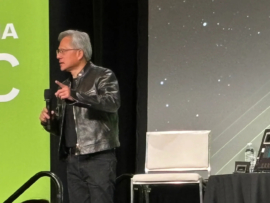
NVIDIA CEO Jensen Huang has dismissed security concerns over the company’s H20 chips, saying they pose no national risk to China and that continued sales would benefit both sides. His remarks follow reports that NVIDIA has slowed development of the H20 after Beijing urged domestic firms to avoid the chip.
H20 is “not a national security concern,” Huang told reporters in Taipei during a visit to Taiwan Semiconductor Manufacturing Company (TSMC) on Friday, according to AFP. He also described the chip as “great for America” and “great for the Chinese market,” indirectly supporting US President Donald Trump’s recent decision to resume sales of some chips to China, despite security reservations.
NVIDIA has asked suppliers Foxconn, Amkor Technology, and Samsung Electronics to stop work relating to the H20 chip, according to reports from Reuters and The Information. Huang told reporters in Taipei that his company has a backlog of these chips and is waiting for more orders from Chinese customers before it buys more components, according to Reuters.
Sales from China have likely slowed down since the country’s cyberspace regulator warned of national security concerns tied to the H20 chip. Chinese regulators then cautioned domestic firms such as ByteDance, Alibaba, and Tencent against buying H20, before issuing a stricter order to halt purchases pending a full national security review.
It is the second reputational blow NVIDIA has taken in recent months. In May, a group of bipartisan US lawmakers proposed that AI chipmakers, including NVIDIA, put tracking technology into their products to verify their locations before export. NVIDIA has firmly rejected this idea.
NVIDIA readied H20 inventory for China after export license granted
The security allegations come at a time when NVIDIA’s business should be booming.
In August, as part of a broader trade deal, the US started granting licenses allowing the company to sell some of its chips, including H20, to China, provided it hands over 15% of the revenue from these sales to the government. Licenses had only been mandatory since April, and cost NVIDIA an estimated $5.5 billion in lost sales.
NVIDIA quickly ordered 300,000 H20 chips from manufacturer TSMC after its license was approved, according to Reuters, anticipating strong demand from its Chinese customers. However, concerns raised by China meant this surge never arrived, leading to a backlog.
US seeks chip sovereignty but relies on China sales to stay ahead in AI
The US has restricted exports of advanced chips and related technology to China since 2022, prompting companies like NVIDIA to design products that bypass them, such as the H20.
More recently, Trump has doubled down on efforts to secure America’s lead in AI, promoting domestic chipmaking with high import tariffs and tax breaks. In addition to financial motivations, Washington has cited national security concerns, particularly China’s potential use of AI for military applications.
Trump had been willing to take an economic hit in the form of lost sales for companies like NVIDIA in the name of security. However, his willingness to grant chip export licenses in exchange for a share of the profits signals that he hopes to recapture some of the lost revenue.
Indeed, while Trump wants to keep China at arm’s length, restricting chip sales there works directly against his goal of the US becoming the AI world leader, a goal Huang has stressed to him during their meetings.
The NVIDIA CEO told reporters that he “explained that AI is going to advance around the world, with or without the United States, and it is important for us to maximise our AI export technology at a time when this industry is important,” according to CNBC.
NVIDIA may have a new chip in the works for China
NVIDIA is reportedly working on a new AI chip for customers in China that outperforms the H20, tentatively named the B30A, according to Reuters. When asked about this on Friday, Huang said that whether to offer China a product designed for AI data centres is “not our decision to make,” but remains a possibility.
“It’s up to, of course, the United States government, and we’re in dialogue with them, but it’s too soon to know,” he said, per AFP.
In more artificial intelligence news, AI companies in China have formed two new alliances aimed at reducing the industry’s reliance on the US.






